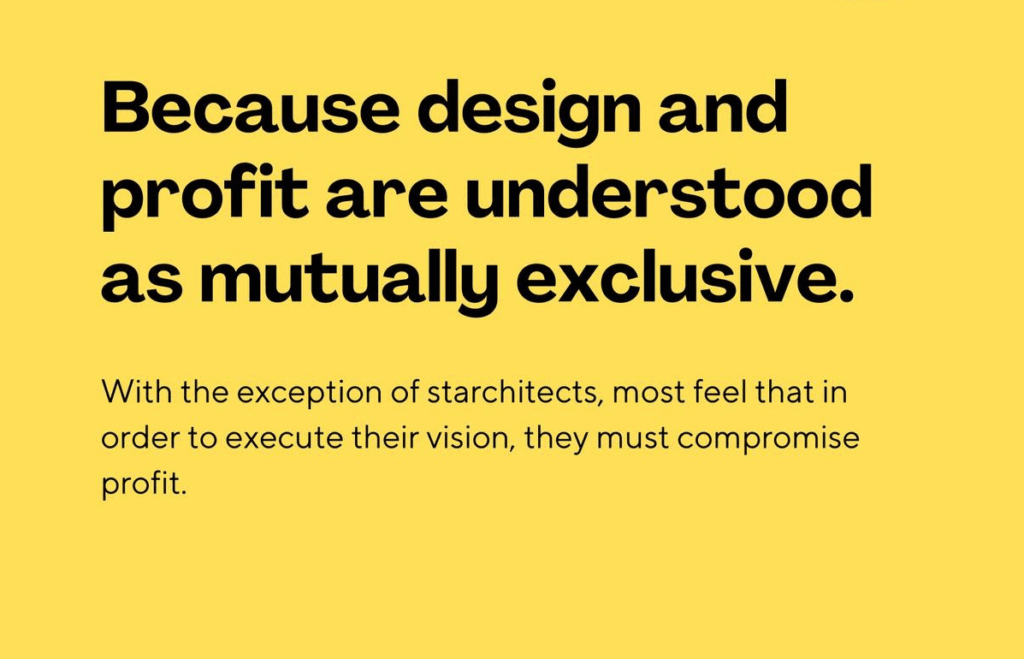
The Economics of Architecture – Service vs Business
The Economics of Architecture – Service vs Business Why do architects start their firm/practice? Most would give the reason of a passion to design with creative freedom.

Why do architects start their firm/practice? Most would give the reason of a passion to design with creative freedom. Rarely do you hear it was due their burning desire to do BUSINESS. Rather, business is something most do to sustain their love of architecture. But should you have to sacrifice your health, relationships, financial well-being and sanity to do work you enjoy?
I think this happens because architects are taught that profitability is not something to aim for. “Design should be the hero of architecture.” This encapsulates much of what stops architects being properly rewarded for their work. They are often spread thin on many small projects and end up feeling like their skills and experience is under-utilised. If you look at “starchitects”, most of them are actually good businesspeople and they understand that profit is crucial to keep their practice (and design) intact.
Architects are often the first people to be appointed in a construction project, but the last to be paid. A doctor or lawyer with an equivalent education and experience, also providing “service”, earns much more than most architects of the same caliber. Why? We spent little or no time learning to sell architectural services.
Capable architects know little about the mechanics of running a firm. Payroll, HR, marketing, sales and public relations are foreign topics. They want the jobs, but they don’t know how to get them. They need employees, but lack management skills or knowledge of how to team build, recruit or downsize during a recession. So what should we do?
“We need to embrace our creativity and become more entrepreneurial and adaptable. We need to find new opportunities, and, where necessary, change our business models… We not only need to think about the business of design, but we also need to consider the design of business. Let’s become archi-preneurs and be business savvy, while constantly surveying the market place to seek opportunities.” says Jane Cameron, director of Jane Cameron Architects, Australia in 2014.
Like most companies, the beginning of April was a calm after the storm of financial year-end commotions. So this was the right time to take stock of and reflect upon the perpetual tussle of monetizing the services provided by an architectural practice.
Being in the industry for more than 50 years now, Ar. Vishwas Kulkarni compares the economy of architecture from when he started practicing vs now: “Architecture doesn’t exist outside of the economy and in fact, how we build each building directly affects the economy of our cities, and vise versa. When I started doing some projects in the second year of college, when India’s economy was very low, the cost of construction in Solapur was as low as Rs 20 per sq. ft.! In the 1970s, it was around Rs 40–50 per sq. ft., and designing within that budget was a great challenge sometimes. The aim was to build a strictly functional building with as less resources as possible. We were earning about Rs 430 per month. Now, the country’s economy has boomed and so have the construction costs to more than Rs3500 per sq.ft, keeping in mind the fluctuations in the value of currency also. When I started, I saw it more as a service to the people and did not have a large vision for the future of the firm. “
Vishwas Kulkarni Architects, which started as a boutique practice evolved into the VK Group brand today due to the conscious shift in business model under the leadership of Ar. Hrishikesh Kulkarni. This year, VK:a architecture completes a milestone of 50 years of ethical architectural practice while boasting a significant growth rate. One of the ways in which the company has tried to balance passion to the profession with profitability is by having a separate operations team VK:o. This has allowed the architects and designers to concentrate on producing best solutions to the clients while VK:o, headed by Apoorva Kulkarni, handles the finances, HR and quality control.
On being asked “As a non-architect who has been surrounded by architects and operating an an architectural firm, do you think there is a need for an architect to understand business better? What is the backbone of the success of the growth of a firm?”, Apoorva Kulkarni answers: “Definitely! Architects and most building consultants, work paycheck to paycheck. So without a business plan from the beginning, cashflow becomes an issue. A system needs to be set up to ensure smooth functioning, along with candid discussions with the clients. Maintaining a structure in the organisation and having the acumen to segregate core competencies and operational requirements is the foundation. After that, following the process with discipline will surely lead to success.”

The Economics of Architecture – Service vs Business Why do architects start their firm/practice? Most would give the reason of a passion to design with creative freedom.

Pune Riverfront Development – A Discussion https://www.youtube.com/watch?v=7QA3ilS314Y The proposed design for the Pune Riverfront Development (RFD) – by HCP Design, Planning & Management Pvt. Ltd.,

Reimagining Architectural Work Culture https://www.youtube.com/watch?v=fatYZliQ-tY In the fast-paced world of architecture, success is not solely determined by the grandeur of designs but also by the